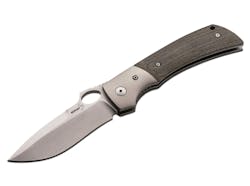Boker has just introduced another knife – this time a folder – with simple, attractive, obviously working lines. The 6.6-ounce Squail is the design of Charles Marlowe of Omaha, Nebraska. If you know working knives, and what makes them tick, you’ll recognize those elements in this knife. The Squail sports a 4-inch hollow-ground 440C blade, a 9.375-inch OAL, Micarta scales, and matte titanium bolsters. The slight recurve of the blade blends with the slightly dropped handle, and makes for a naturally-held, fine cutting knife. With a blade ground from 4mm stock, and a correspondingly hefty handle, the overall feel in the hand is one of beefiness and cutting proficiency. Not a dainty knife, nor a really large one, but a serious ounce worker, even though it’s almost too pretty to use! The liner-locking Squail carries tip-down in the pocket with its discrete pocket clip. It’s easy to open with its over-sized thumb hole, and is really a perfect sized and heft for hard jobs.
440C is a very good steel, one that’s used widely in knives that are looking to achieve bang for the buck. Of course, no matter how good the steel, it has to be ground and heat-treated properly to yield good performance. Boker doesn’t disappoint with the Squail. As it comes from the factory, the hollow-ground blade slices nice little ribbons of free-hanging paper. This level of achievable sharpness is much like the 4-minute mile. Once it was an almost unachievable goal, now its common with very good runners. Likewise, cleanly slicing free-hanging paper is quite a level of performance (helped in this case, no doubt by the hollow-ground blade), and the Squail does it easily and well. It also shaves hair from my arm with the ease of a razor. Now, slicing paper requires not only a sharp blade, but one with a fairly smooth (non-toothy) edge. On the other hand, slicing a fibrous material like manila rope usually calls for a somewhat toothy edge, and well as sharpness. But the Squail also turns in superior performance on this medium, too. It cut cleanly through ¾-inch manila rope in one pass (in case you didn’t know, that is a superior performance). I suspect that the reason that the Squail can perform so well on both materials is much due to the hollow-ground blade and the recurve. All-in-all, these feats indicate a superior design, well executed. Finally, on the “all-purpose” medium of cardboard, the Squail sliced it, too, with ease and aplomb. The performance of the Squail is easily in the top tier of the folding knives that I’ve used and tested over the last 19 years.
The construction is sturdy, too, with a beefy lock-up and pivot pin, and makes for an interesting combination with the hollow-ground blade. 6.6-ounces is heavier than your “typical” folder, but is not “too heavy”. By “too heavy”, I mean a knife that’s uncomfortable to carry or work with. The Squail sits as comfortably clipped to your pocket as any other 4-inch bladed folder. The scales and bolster are de-horned and smooth, as a working knife out to be. The handle is flat enough for good indexing, but not so flat as to be uncomfortable to work with. Again, all the right design choices and trade-offs were made.
The upswept spear-point blade is also a superior thruster. Thrusting is something that a typical knife needs to do far less than slicing, but when its necessary, a knife that does it well is better than one that doesn’t (and believe me, some don’t). The tip is located so that working with it on delicate tasks is easy and natural, although honesty compels me to point out (no pun intended) that in this department (fine work with the point) the Squail is “merely” very good as opposed to “superior” in the way it slices all materials. This comment is meant to be the opposite of “damning with faint praise” and is meant to “compliment with faint criticism”.
So who will enjoy owning and carrying the Squail? That would be someone who can appreciate a superior-cutting instrument; someone who enjoys the feel of well-made products in the hand; someone who values intelligent design; someone who like the feel of a little heft when they work a knife; someone who likes to use something a little different (and better) than the ordinary.
About the Author

Ralph Mroz
Ralph Mroz spent 20 years part-time as a police officer in Western Massachusetts, the last seven of which he was assigned to the county drug task force. He was a co-founder of the Police Officers Safety Association and was the developer and presenter of their training material. He was also the person in front of the camera for the Armed Response (www.armedresponsetraining.com) series of training DVDs.
